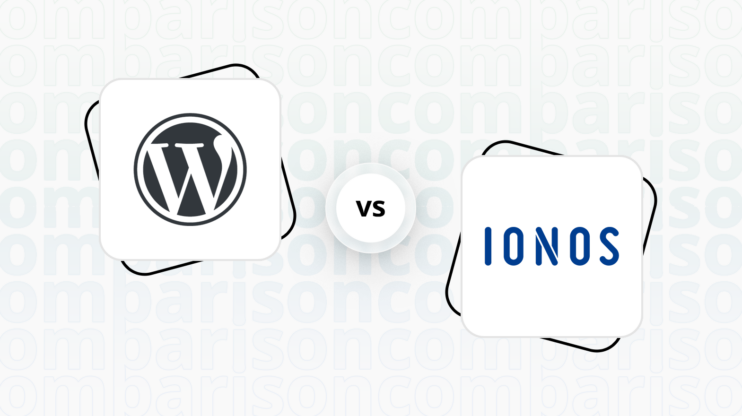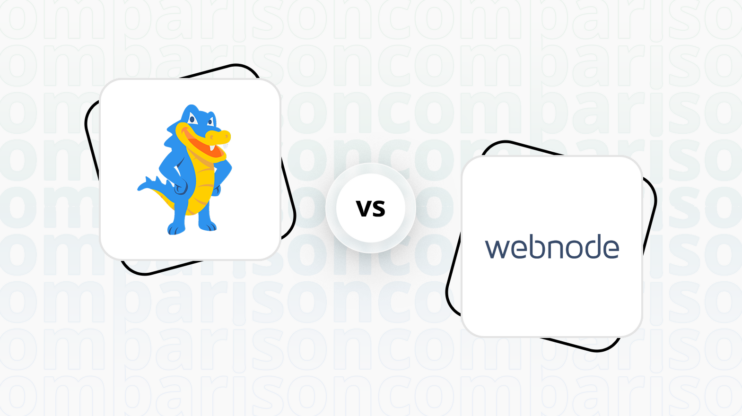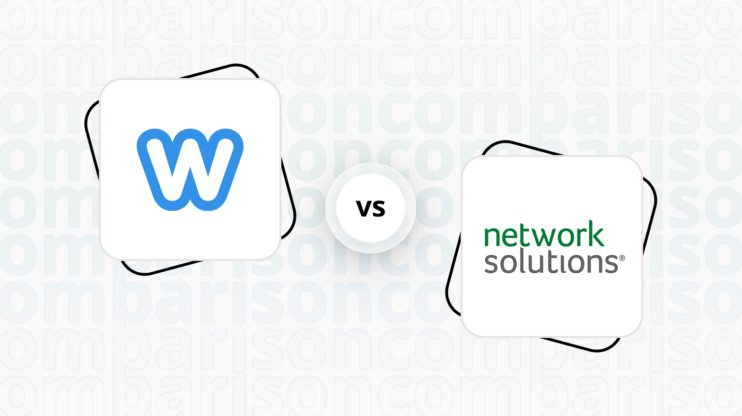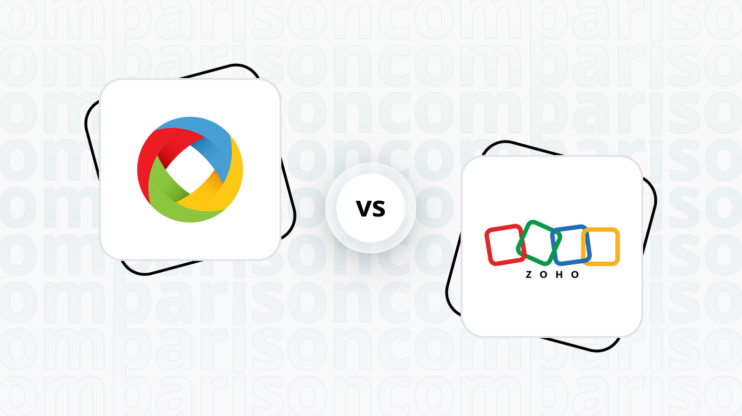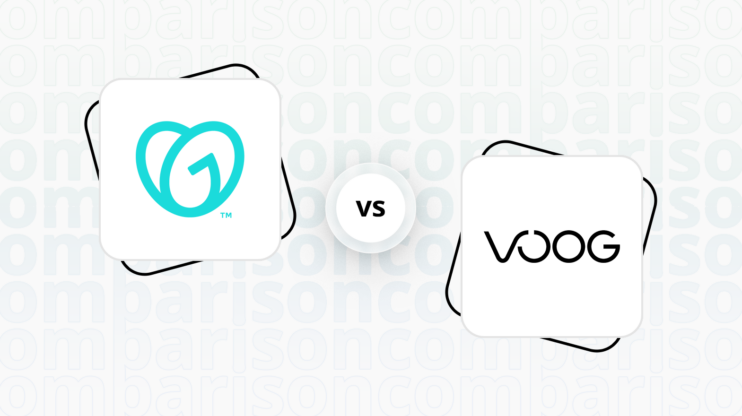Final verdict
Siter.io and Tilda both offer unique strengths, but they cater to different user needs and preferences.
-
Siter.io (Overall Grade: 5.1/10)
is ideal for users who prioritize ease of use and design flexibility. Its drag-and-drop interface and Figma integration make it a great choice for designers and small business owners looking to create professional websites without coding. However, its ecommerce capabilities are limited, making it less suitable for users with extensive ecommerce needs. When comparing Siter.io vs Tilda, Siter.io stands out for its user-friendly design tools and seamless Figma integration. -
Tilda (Overall Grade: 6.7/10)
excels in providing a versatile platform for creating visually appealing websites, landing pages, and online stores. It offers a wide range of templates and design functionalities, making it suitable for bloggers, small businesses, and digital marketers. Tilda’s comprehensive ecommerce features and robust marketing tools make it a better choice for users looking to build and manage online stores. In the Siter.io vs Tilda comparison, Tilda is the preferred option for users seeking a more comprehensive and versatile website building solution.

|

|
|
|---|---|---|
|
Design functionalities & templates |
7.5 |
8.6 |
|
Ease of use |
8.3 |
8.0 |
|
Ecommerce |
3.4 |
7.2 |
|
Website editors |
7.8 |
8.0 |
|
Product testing options |
8.2 |
5.9 |
|
Price |
8.1 |
8.0 |
|
Hosting quality |
3.9 |
6.2 |
|
Website speed optimization |
1.5 |
4.9 |
|
Plugins/extensions and integrations |
5.5 |
7.6 |
|
Marketing features |
2.6 |
6.9 |
|
Customer support |
4.1 |
5.5 |
|
Website security |
6.8 |
7.6 |
|
AI capabilities |
0.0 |
2.1 |
|
User management |
7.1 |
7.3 |
Best for ecommerce
 3.4
3.4
 7.2
7.2
Verdict
: Tilda is the superior choice for ecommerce, offering a more comprehensive set of features and better overall performance compared to Siter.io.
-
Siter.io
: While Siter.io provides basic ecommerce functionalities such as a shopping cart, checkout, and purchase button, it primarily focuses on its design capabilities. Its ecommerce score of 3.4 reflects its limited features in this area. Siter.io is more suitable for users who prioritize design and are willing to integrate third-party tools for ecommerce functionalities. -
Tilda
: Tilda excels in ecommerce with a score of 7.2, thanks to its robust features like product catalogs, inventory management, multiple payment gateways, and built-in CRM and marketing tools. It offers around 20 ready-made online store templates, making it easy for users to create professional ecommerce websites without coding skills. Tilda is ideal for users looking for a comprehensive and user-friendly ecommerce solution.
Best for informational & business websites
 7.2
7.2
 8.4
8.4
Verdict
: Tilda is the superior choice for creating informational and business websites, thanks to its extensive design functionalities and higher overall score. Siter.io, while user-friendly and innovative, falls slightly short in comparison.
-
Siter.io
: Siter.io is designed to simplify website creation with its drag-and-drop interface and unique freehand design tool. It offers a range of templates and design elements, making it suitable for various purposes, including business websites. However, its limited number of templates and integrations may not meet the needs of more complex informational sites. Siter.io scores 7.2 in this category. -
Tilda
: Tilda excels with its wide range of pre-designed blocks and templates, focusing on typography and visual content. It is ideal for bloggers, small businesses, and digital marketers who need visually appealing and professional-looking websites. Tilda’s versatility and comprehensive design options make it a standout choice for informational and business websites, earning it a score of 8.4.
Detailed comparison
Design functionalities & templates
Design FunctionalitiesRepresents how well each platform allows for creative design and customization of websites.Score Components:
- Template Variety (30%): Range and quality of design templates.
- Customization (30%): Flexibility and options for design alterations.
- User Interface (20%): Ease and intuitiveness of the design process.
- Responsiveness (10%): Adaptability to different devices and screen sizes.
- Innovation (10%): Unique design features and tools.
 7.5
7.5
 8.6
8.6
Winner: Tilda.
Tilda offers a wider range of templates and design functionalities, making it a more versatile choice for users with diverse design needs.
Siter.io includes a handful of customizable templates for various website types, such as landing pages, portfolios, and e-commerce sites, ensuring users can start with a solid foundation and tailor each site to their needs. However, the limited number of templates is compensated with a UI which is very similar to design tools like Figma and AdobeXD. Additionally Siter.io has built in Figma plugin, which helps to export Figma designs directly to Siter.io platform, and make changes and tweaks right on Siter.io.
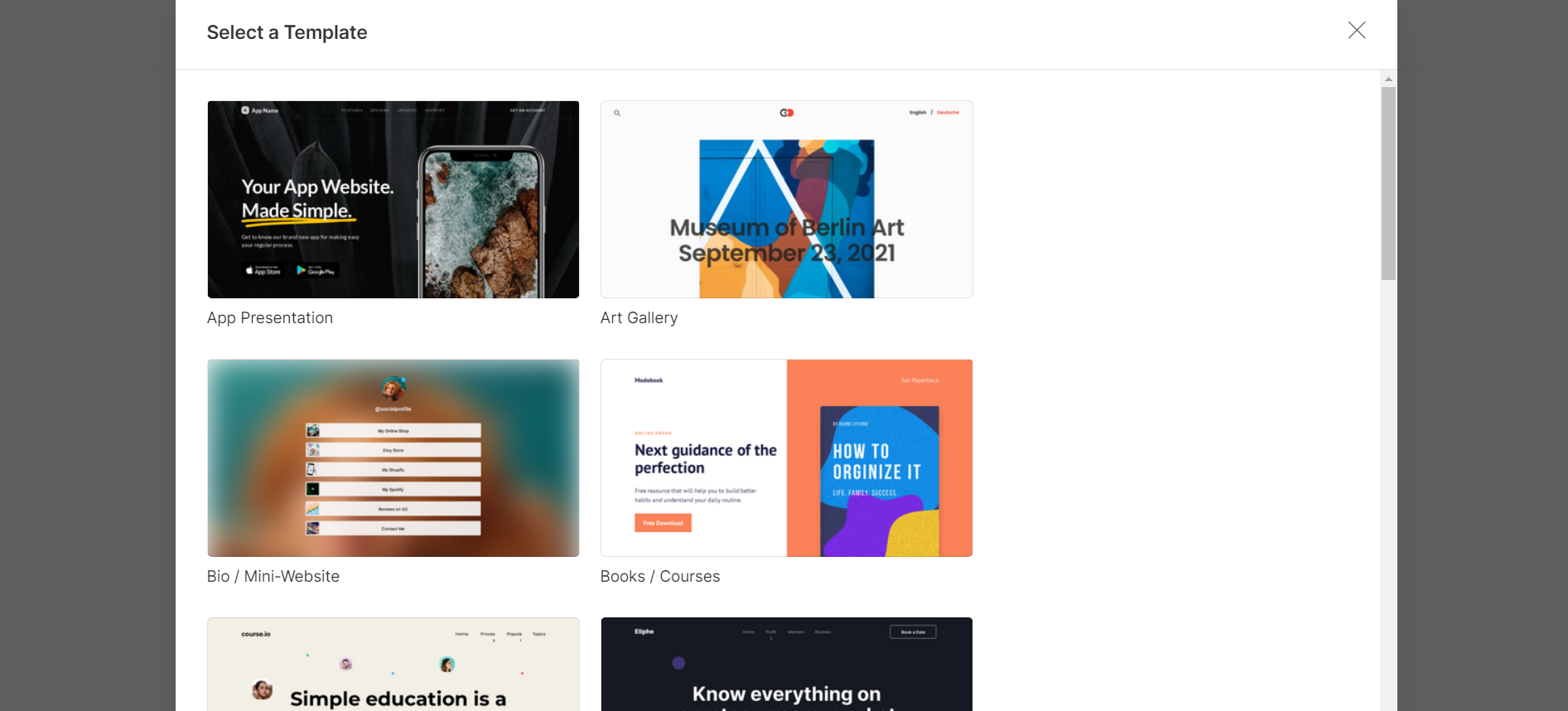

On the other hand, Tilda offers a diverse selection of design templates that are suitable for various types of content, all crafted by professional designers. These templates emphasize gorgeous typography, minimalist blocks, and striking images. Users have the flexibility to modify any template significantly or even start from scratch, ensuring the final website can meet a wide range of design preferences and requirements.
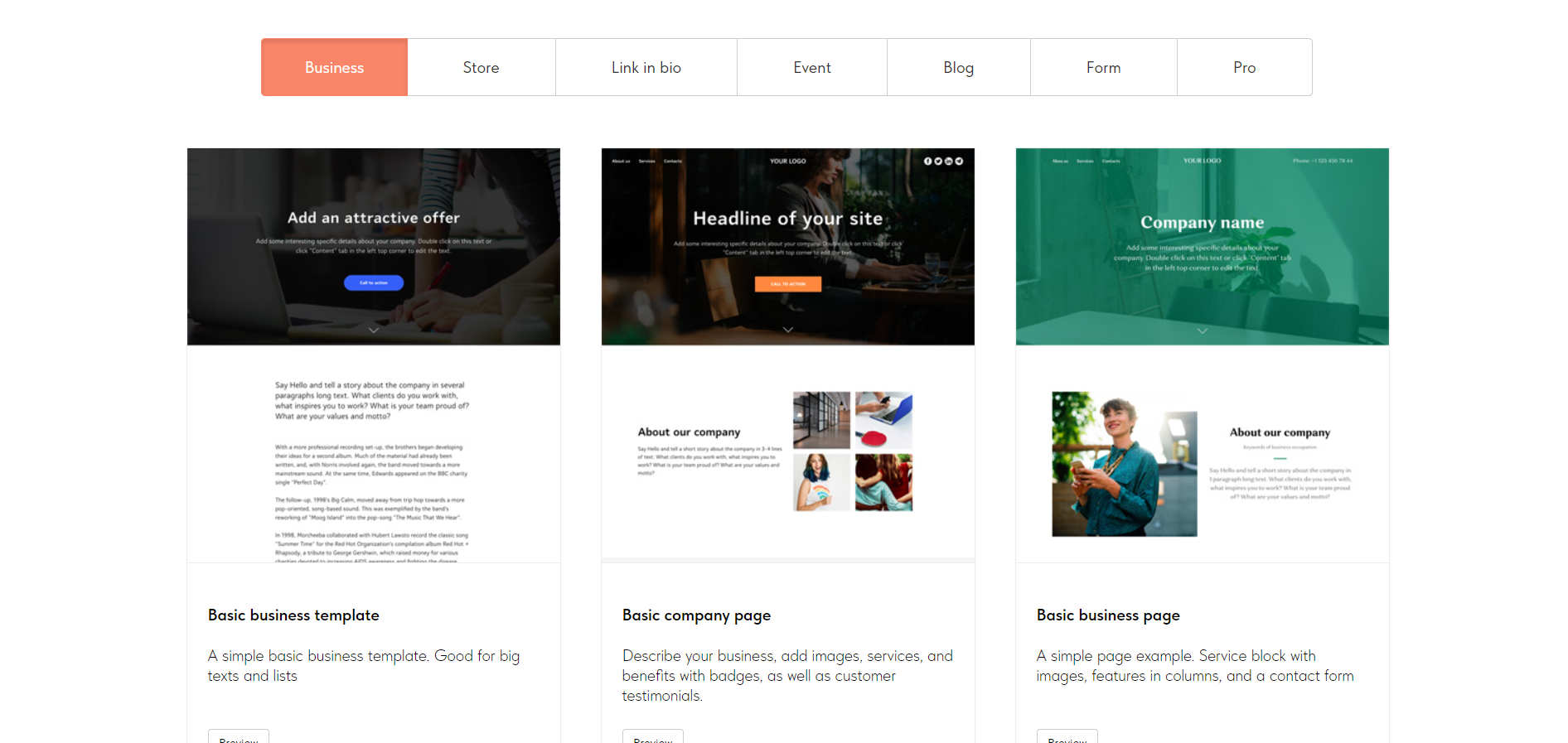
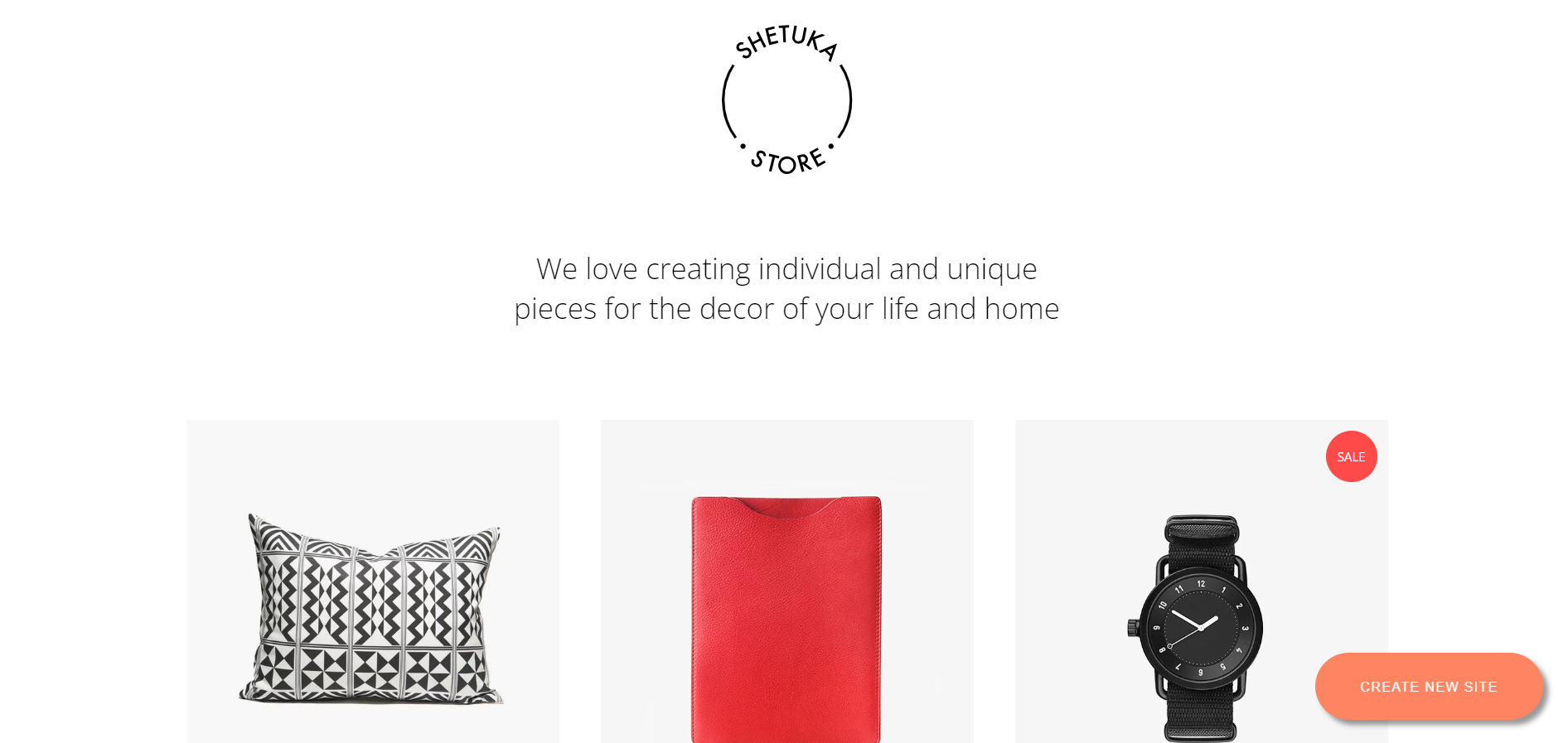
Get a head start on website creation with AI
Create a custom website tailored to your business needs 10X faster with 10Web AI Website Builder!
Ease of use
Ease of useReflects the platform’s overall user-friendliness.Score
Components:
- Learning curve (40%): Quickness and ease of getting started.
- Interface design (30%): Simplicity and intuitiveness of layout.
- User guidance (20%): Quality of tutorials and support.
- Flexibility (10%): Adaptability to various user skills.
 8.3
8.3
 8.0
8.0
🏆 Winner: Siter.io
. Scoring 8.3, Siter.io edges out Tilda, which scored 8.0, in terms of ease of use. Siter.io’s unique feature of importing designs from Figma and its user-friendly interface make it slightly easier to use than Tilda.
Learning Resources
🏆 Winner: Draw
. Both Siter.io and Tilda offer a range of learning resources and tutorials designed to help users effortlessly create and design websites without coding knowledge. However, both platforms lack large communities of users across various platforms and neither has an official community forum.
For ecommerce
EcommerceMeasures the platform’s effectiveness in supporting online business activities.Score Components:
- Ecommerce themes and templates (20%): Variety and design of templates.
- Product management (25%): Ease of managing and organizing products.
- Payment options (25%): Variety and convenience of payment methods.
- Ecommerce features (20%): Features for managing an ecommerce store.
- Integration (10%): Compatibility with external e-commerce tools and services.
 3.4
3.4
 7.2
7.2
When it comes to ecommerce, Tilda clearly outperforms Siter.io. Tilda’s ecommerce score of 7.2 is significantly higher than Siter.io’s score of 3.4. This is likely due to Tilda’s more comprehensive ecommerce offerings and features.

|

|
|
|---|---|---|
|
Ecommerce themes and templates |
4.5 |
6.5 |
|
Product page customization |
6.5 |
7.0 |
|
Payment processing and commissions |
3.0 |
7.5 |
|
POS capabilities |
2.0 |
0.0 |
|
Payment gateways |
3.5 |
7.8 |
|
Product numbers |
2.5 |
6.0 |
|
Additional ecommerce features |
3.0 |
6.5 |
Siter.io ecommerce features:
- Shopping cart
- Checkout
- Purchase button
Siter.io’s ecommerce features are quite basic, focusing primarily on its UI design capabilities rather than ecommerce functionality. It is possible to build an ecommerce store, but its features are very limited.
Tilda ecommerce features:
- Product Catalogs and Inventory management
- Payment Gateways integration
- Shipping options
- Order management
- Built-in CRM and marketing tools
Tilda, on the other hand, offers a user-friendly platform for creating ecommerce websites with features like ready-made templates, various payment system integrations, and SEO optimization. It supports inventory management, CRM for order tracking, and tools for email marketing and membership areas.
Ecommerce themes & templates
Siter.io has only a few ecommerce specific templates, however its built-in Figma integration enables the use of a variety of third-party website templates designed in Figma to create a fully functional website directly on the platform. Tilda allows users to build their ecommerce sites using around 20 ready-made online store templates, emphasizing ease of use and the ability to create a store without needing coding or web design skills.
Product page customization
Siter.io prioritizes its design capabilities, offering a wide range of customization options that are only limited by the user’s skill level. Tilda enables a wide range of customizations for product pages in online stores, including the design, ecommerce functionalities, and integration with external services. Features like product variants, delivery options, promotional codes, and diverse payment system integrations allow for a personalized shopping experience.
Payment processing
Siter.io primarily serves as a website design tool rather than a dedicated ecommerce platform. While it does allow for the creation of ecommerce websites, its functionality for integrating payment gateways is quite limited. However, it does support custom code injection, enabling users to integrate third-party payment widgets like PayPal or Stripe. The Tilda website builder supports a variety of popular payment systems such as Stripe, PayPal, and 2Checkout, allowing for easy integration to accept online payments. Tilda does not impose additional transaction fees beyond those of the payment gateways themselves.
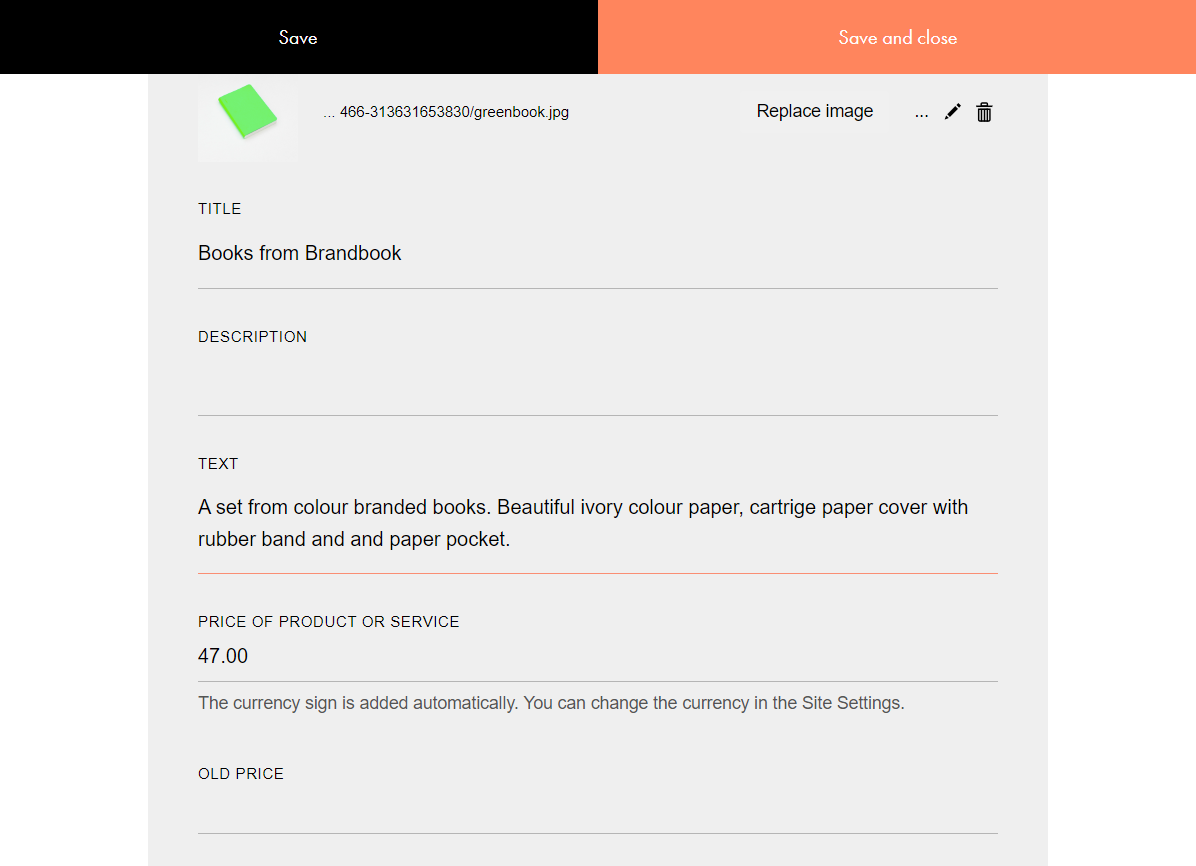
Website Editors
Website EditorsEvaluates the platforms’ website building and editing capabilities.Score Components:
- Customization tools (40%): Range and power of editing features.
- Editor usability (30%): User experience within the editor.
- Design flexibility (20%): Freedom in layout and design changes.
- Update and maintenance ease (10%): Simplicity of updating and maintaining the site.
 7.8
7.8
 8.0
8.0
🏆
Winner: Tilda
. Tilda, with a score of 8.0, offers a user-friendly, block-based design approach that simplifies the process of creating websites without requiring in-depth coding knowledge. It features advanced customization options through its Zero Block feature, allowing for detailed control over design elements for those needing more specific layouts. The platform supports responsive design, ensuring websites are optimized for all devices, and includes built-in SEO tools, analytics, and a range of integrations with third-party services for extended functionality.
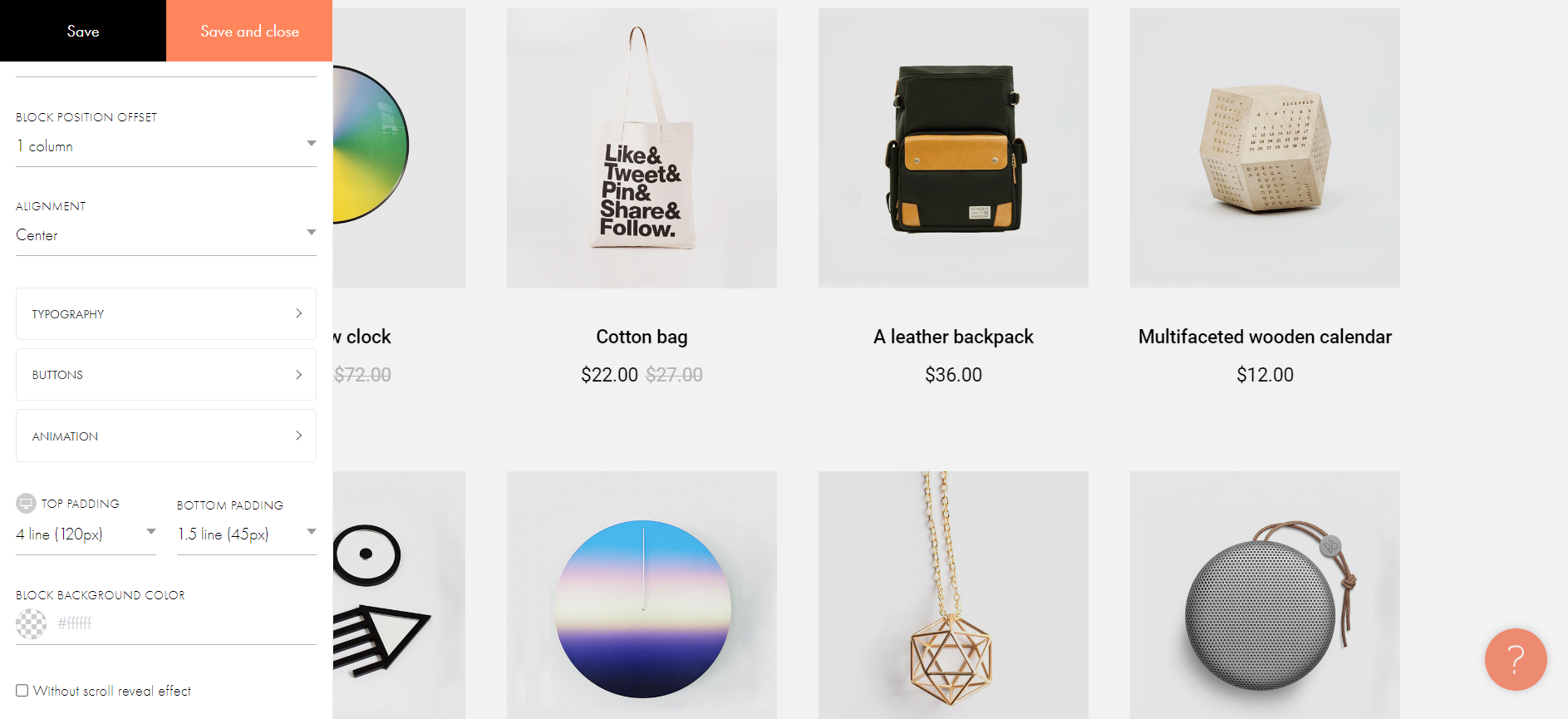
Siter.io’s editor, scoring 7.8, is designed to empower users with the ability to create websites seamlessly without any coding skills. It features an intuitive interface, real-time collaboration, and Figma integration, enhancing productivity and creativity for designers and teams. The editor supports inserting custom code for additional functionality, accessing thousands of free icons, and integrating with Unsplash for high-quality, royalty-free photos.
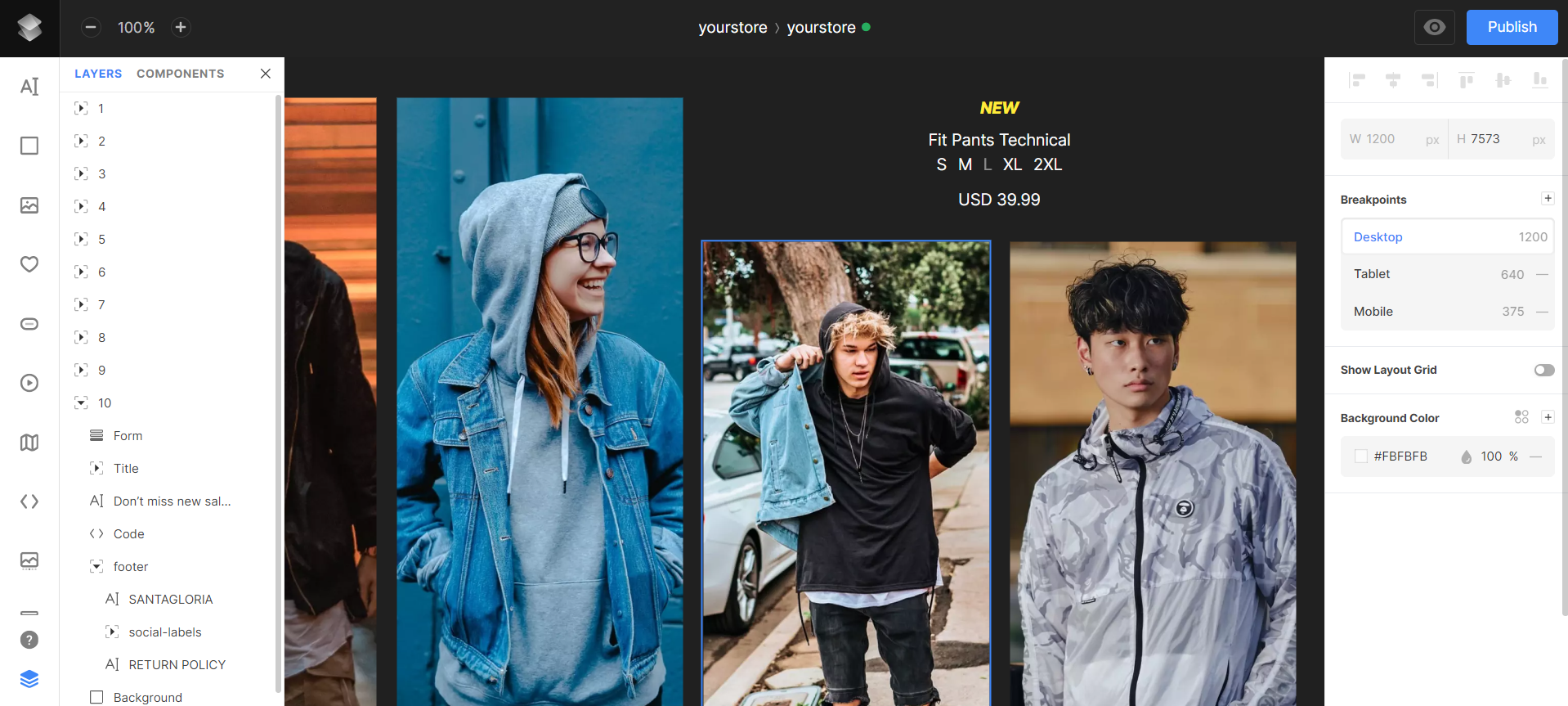
Mobile editor/app
 0
0
 5.5
5.5
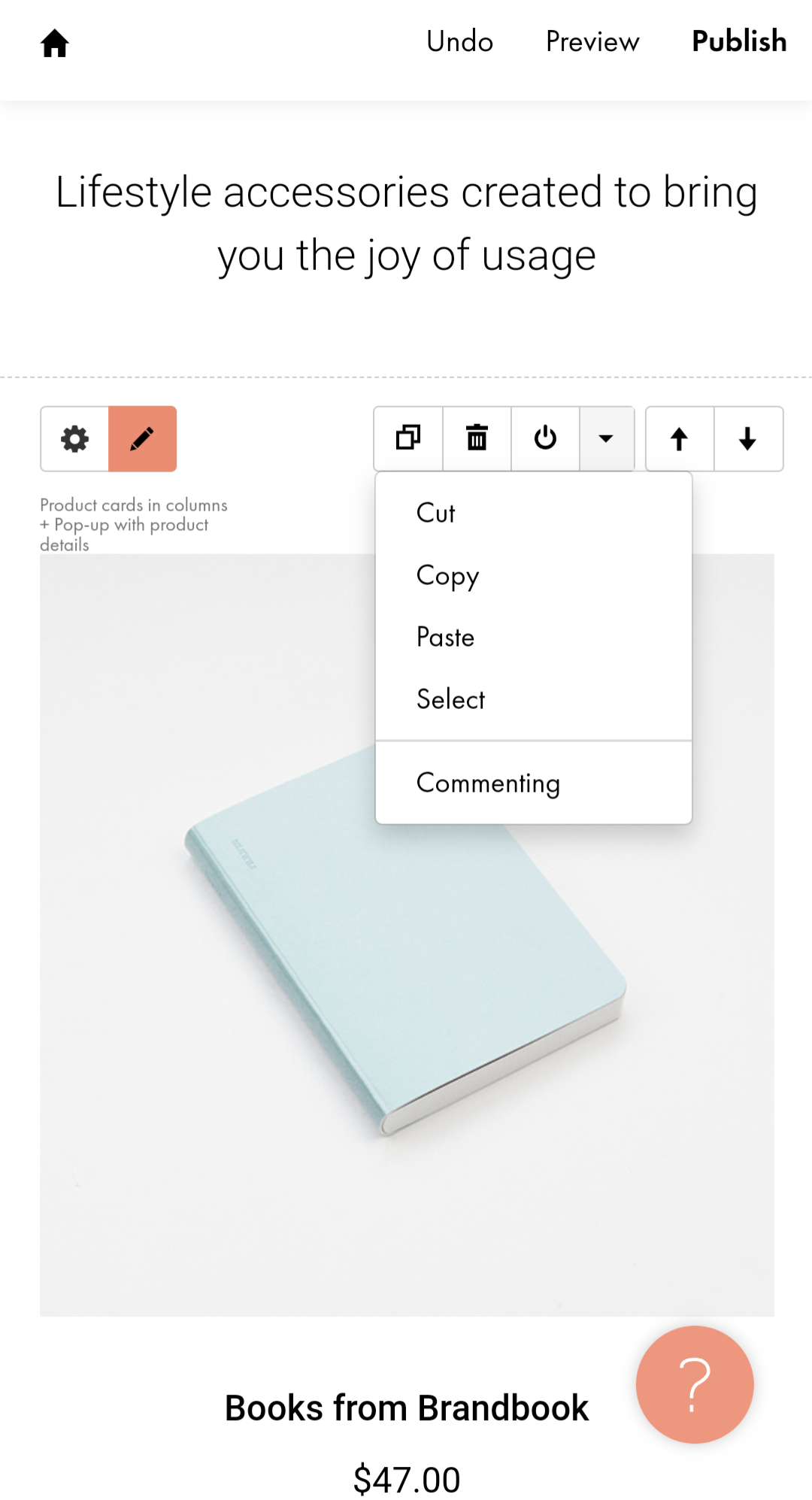
🏆
Winner: Tilda
. Neither Siter.io nor Tilda offer a dedicated mobile editor app. However, Tilda allows users to manage and edit their websites using the mobile browser version of the editor, which gives it an edge over Siter.io in terms of mobile editing capabilities. This feature can be particularly useful for users who need to make quick changes or updates to their website while on the go.
On the other hand, Siter.io does not provide any mobile editing capabilities, which can limit its usability for users who prefer or need to work on their website from a mobile device.
In summary, Tilda receives a higher rating due to its mobile browser editing capabilities, while Siter.io lacks in this area, making it less suitable for users who need to work on their website from a mobile device.
Product testing options
Product Testing OptionsAssesses the options for trying out platform features before commitment.Score Components:
- Trial quality (40%): Extent and usefulness of the trial or free version.
- Feature accessibility (30%): How many features are available to test.
- Trial duration (20%): Length of the trial period.
- Ease of transition (10%): Smoothness of moving from trial to paid plans.
 8.2
8.2
 5.9
5.9
Overall Result
:
Siter.io Wins
. Siter.io scores 8.2 in product testing options, significantly higher than Tilda’s 5.9. Siter.io offers a free version that allows users to test all premium features, providing a comprehensive evaluation of the platform. On the other hand, Tilda also offers a free version, but only some features can be tested.

|

|
|
|---|---|---|
|
Free Plan |
Yes | Yes |
|
Trial Duration |
No | No |
|
Testing Premium Features |
All features with free plan |
Some features with free plan |
|
Money Back Guarantee |
No | No |
Price
PriceLooks at the cost-effectiveness and value for money of each platform.Score Components:
- Plan value (40%): What each pricing tier offers.
- Transparency and clarity (30%): Clearness of pricing structures.
- Flexibility of plans (20%): Range of options to suit different budgets.
- Hidden costs (10%): Additional expenses not included in the plan.
 8.1
8.1
 8.0
8.0
Siter.io and Tilda have similar pricing scores, with Siter.io slightly ahead.
Both platforms offer a range of plans to suit different needs, from free options to more comprehensive packages. Neither platform offers an enterprise plan.

|

|
|
|---|---|---|
|
Free |
Start (Free/month): Includes unlimited teammates, up to 10 pages, 3 forms, Figma plugin, and SSL certificate. Additional websites are free, and SEO and page speed features are not included. Additionally, it’s not possible to publish any of the websites with the free plan. |
Free ($0/month): Tilda’s Free plan allows for 1 website with up to 50 pages per website and 50 MB of space per project. It includes a free subdomain on tilda.ws, responsive design on all devices, basic animations, a built-in image and icon library, and Tilda CRM. |
|
$0-$10 |
Solo ($8/month): For 1 website and includes 2 editors, up to 10 pages, 3 forms, Figma plugin, and SSL certificate. Additional editors cost $4 each. Value for price: 6.0 |
No offering at this amount. |
|
$10-$20 |
Plus ($14/month): Offers 3 websites with 4 editors, up to 50 pages, 5 forms, Figma plugin, and SSL certificate. Additional editors cost $6 each. Value for price: 7.5 |
Personal ($15/month): The Personal plan offers 1 website with up to 500 pages and 1 GB of space. It includes all features of the Free plan plus the ability to connect a custom domain, advanced animations, full access to the Block Library, analytics, SEO tools, and online store capabilities. Value for price: 7.5 |
|
$20+ |
Pro ($29/month): Provides 5 websites, 6 editors, unlimited pages, unlimited forms, Figma plugin, and SSL certificate. Additional websites cost $8 each. Value for price: 8.5 |
Business ($25/month): The Business plan expands capabilities to 5 websites per account, each with up to 500 pages and 1 GB of space, including source code export and API access. It builds upon the Personal plan features with additions suitable for more extensive business needs. Value for Price: 9.0 |
location. As a result in rare cases the prices displayed here can differ from the ones you see on their
websites.
Hosting quality
Hosting
qualityExamines the reliability and performance of the hosting solutions.Score Components:
- Uptime (40%): Consistency and reliability of website availability.
- Speed (30%): Loading times and performance.
- Bandwidth and storage (20%): Sufficiency of resources provided.
- Data centers (10%): Quality and distribution of hosting infrastructure.
 3.9
3.9
 6.2
6.2
🏆
Winner: Tilda
Tilda offers cloud hosting with up to 1GB storage capacity and a 99.9% uptime. However, it does not provide an uptime guarantee and does not disclose the locations of its data centers. On the other hand, Siter.io also offers cloud-based hosting but lacks information on bandwidth, storage limitations, and does not provide an uptime guarantee or disclose any information about its data centers. Due to these limitations, Tilda has a higher hosting quality score.

|

|
|
|---|---|---|
|
Do they offer hosting? |
Yes |
Yes |
|
Data Centers: |
Not disclosed |
Not disclosed |
|
Type of hosting: |
Cloud based hosting |
Cloud Hosting |
|
Uptime: |
Not disclosed |
99.9% |
|
Uptime Guarantee: |
No |
No |
Website Speed Optimization
Website Speed OptimizationEvaluates optimization of website loading timesScore Components:
- PageSpeed Score (30%): Google’s score indicating performance optimization.
- Loading Time (30%): The average time until a website is fully interactive.
- Mobile Optimization (15%): Optimization effectiveness for mobile devices.
- Resource Optimization (15%): Optimizing images, scripts, and other heavy resources.
- CDN Usage (10%): Use of CDN to enhance speed across geolocations.
 1.5
1.5
 4.9
4.9
🏆 Winner: Tilda
Both Siter.io and Tilda have strategies in place for website speed optimization, but Tilda has a higher Website Speed Optimization score.

|

|
|
|---|---|---|
|
Focus |
Mobile Responsiveness, SEO optimization |
Lazy Loading, Image Optimization |
|
Performance Tools |
Not disclosed |
Not disclosed |
|
Key Strategies |
Mobile Responsiveness, SEO optimization |
Lazy Loading, Image Optimization |
|
Load Times |
Not disclosed |
Varies depending on optimization and website complexity |
|
Page Speed Scores Range |
Not disclosed |
Not disclosed |
|
Core Web Vitals Improvement |
Not disclosed |
Not disclosed |
Siter.io is a website builder that focuses on mobile responsiveness and SEO optimization for speed optimization. However, it does not disclose any information about its load times, PageSpeed score ranges, or Core Web Vital improvements.
On the other hand, Tilda, a web-based platform for creating websites, landing pages, and online stores, focuses on lazy loading and image optimization for speed optimization. However, it does not provide any specific information about its load times, PageSpeed score ranges, or Core Web Vital improvements. The load times and PageSpeed scores are said to vary depending on optimization and website complexity.
Get a head start on website creation with AI
Create a custom website tailored to your business needs 10X faster with 10Web AI Website Builder!
Plugins and integrations
Plugins and integrationsMeasures the range and effectiveness of additional plugins and integrations.Score Components:
- Variety of options (40%): Range of available add-ons.
- Integration smoothness (30%): Ease of integrating plugins into the site.
- Quality of plugins (20%): Functionality and reliability of the options.
- Custom integration capabilities (10%): Support for custom or third-party integrations.
 5.5
5.5
 7.6
7.6
🏆 Winner: Tilda.
Tilda scores 7.6, offering a diverse range of integrations with services for payments, forms, analytics, and more. This allows users to enhance the functionality of their websites significantly. On the other hand, Siter.io, with a score of 5.5, offers limited integrations, primarily focusing on its design capabilities. However, it does support custom code injection, allowing users to incorporate third-party plugins as needed.
Marketing Features
Design FunctionalitiesRepresents how well each platform allows for creative design and customization of websites.Score Components:
- Template Variety (30%): Range and quality of design templates.
- Customization (30%): Flexibility and options for design alterations.
- User Interface (20%): Ease and intuitiveness of the design process.
- Responsiveness (10%): Adaptability to different devices and screen sizes.
- Innovation (10%): Unique design features and tools.
 2.6
2.6
 6.9
6.9
🏆
Overall Winner: Tilda
. Tilda stands out for its more comprehensive marketing tools, especially in SEO, email marketing, and social media integration. Siter.io is strong in analytics and ad campaign management, but lacks in email marketing and social media integration.

|

|
|
|---|---|---|
|
SEO Tools |
Basic SEO features |
Comprehensive SEO features |
|
Email Marketing |
No |
Through integration of third party services |
|
Blogging |
Possible to design a simple blog |
Disqus Comments integration, Categories and tags |
|
Social Media Integration |
No |
Yes |
|
Analytics and Reporting |
Google analytics integration |
Google Analytics and Google Tag Manager integration |
|
Ads and Promotions |
Facebook Pixel integration |
No |
Customer Support
Customer supportEvaluates the quality and availability of support options.Score Components:
- Response time (40%): Speed of support responses.
- Support quality (30%): Effectiveness and helpfulness of the support.
- Availability (20%): Range of support channels (phone, chat, email).
- Resource richness (10%): Quality of self-help and educational materials.
 4.1
4.1
 5.5
5.5
🏆 Winner: Tilda
. In the comparison of Siter.io vs Tilda, Tilda edges out Siter.io with a slightly higher customer support score. Tilda provides email support and a comprehensive Help Center filled with articles and tutorials, which users find helpful for resolving issues independently.
Siter.io also offers email support and an extensive help center, but it lacks specified support hours, which can be a drawback for users needing timely assistance. While both platforms focus on self-help resources, Tilda’s higher score suggests a more satisfactory support experience overall.
Security
SecurityLooks at the platforms’ security measures and data protection.Score Components:
- Data protection (40%): Safeguards for user and customer data.
- SSL and encryption (30%): Implementation of secure connections.
- Compliance (20%): Adherence to industry security standards.
- Regular updates (10%): Frequency of security updates and patches.
 6.8
6.8
 7.6
7.6
🏆
Winner: Tilda
. Tilda’s security measures are more comprehensive and transparent compared to Siter.io. Tilda ensures GDPR compliance and enhances the privacy and security of websites with features for cookie consent, privacy policies, GDPR-friendly forms, and options for managing data retention and deletion. Additionally, Tilda provides built-in security features such as DDoS prevention and HTTPS encryption to safeguard user data.
On the other hand, Siter.io prioritizes user privacy by employing a zero-knowledge storage system and multi-factor authentication. However, it does not disclose any specific information regarding its website security measures, apart from free SSL certificates.
AI Capabilities
AI capabilitiesMeasures the effectiveness of AI-driven features and tools.Score Components:
- Automation efficiency (40%): Impact of AI on streamlining processes.
- Personalization (30%): AI-driven customization for users or customers.
- AI-Assisted design (20%): Role of AI in website design and functionality.
- Data analysis (10%): Use of AI in interpreting user data and analytics.
 0.0
0.0
 2.1
2.1

|

|
|
|---|---|---|
|
AI Builder |
|
|
|
AI Ecommerce features |
|
|
|
AI content generation |
|
AI feature for generating website content |
|
Additional AI features |
|
|
🏆 Winner: Tilda
. Tilda, with a score of 2.1, has a basic AI feature for generating website content, including headlines and text blocks. This feature is accessible through the Page Editor and requires a detailed description of the website for better text generation.
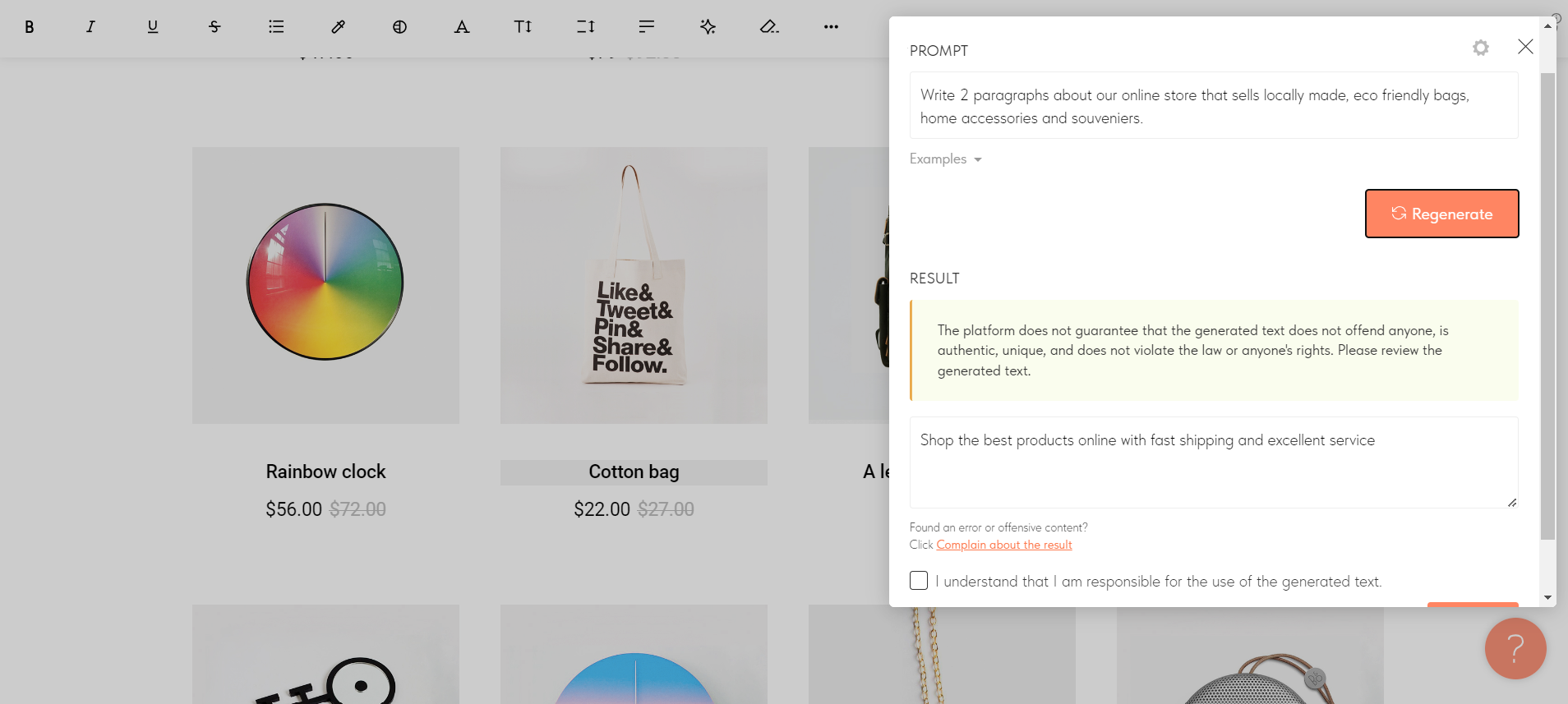
Siter.io, with a score of 0.0, does not have any AI capabilities. It focuses on providing a user-friendly interface with a drag-and-drop feature and freehand design tool, but lacks the AI features that could enhance the website building process.
User Management
User ManagementAssesses the platforms’ capabilities in managing user roles, permissions, and accessibility.Score Components:
- Role Customization (40%): Flexibility in creating and defining user roles and
permissions. - Ease of Management (30%): User interface and tools for managing users.
- Access Control (20%): Effectiveness of access control measures for different user
levels. - Scalability (10%): Ability to manage a growing number of users efficiently.
 7.1
7.1
 7.3
7.3
🏆 Winner: Tilda
. Both Siter.io and Tilda offer collaborative features, but they differ in their approach to user management.
- Siter.io focuses on its real-time collaborative features, offering varying numbers of editors depending on the plan. Each plan provides access for 2 to 6 editors who can edit and design websites, with the option to include additional editors for an extra fee.
- Tilda, on the other hand, allows adding teammates with either Full or Limited access. Full access enables collaborators to edit, publish, delete pages, view requests and statistics, and make changes to built-in website services. Limited access allows the project owner to specify what actions the collaborator can perform. This feature is available as a premium offering, and adding more collaborators requires additional payment, with costs adjusted based on previously paid periods. It applies to the entire account, not individual projects, and collaborators can be managed or replaced through the Site Settings.
Additional Features

|

|
|
|---|---|---|
|
SSL Certificate |
|
|
|
Custom Domain |
|
|
|
Free Custom Domain Included |
|
|
|
International Domains |
|
|
|
Mobile Responsive |
|
|
|
Page Speed |
|
|
|
Website Builder Mobile App |
|
|
|
Convert a Website To An App |
|
|
|
Website Analytics |
|
|
|
Multilingual Sites |
|
|
|
Multiple Users |
|
|
User Feedback
Overall, users appreciate Siter.io for its user-friendly interface and robust features, such as the drag-and-drop editor and customizable templates, making website building accessible to teams without coding expertise. However, there’s a consensus that the platform could improve its integration options to enhance workflow efficiency further. Nevertheless, Siter.io effectively addresses the challenge of website creation without coding skills, benefiting designers, small business owners, and individuals seeking to establish an online presence or portfolio quickly and efficiently.
Tilda Publishing receives varied feedback from users, highlighting its strengths in offering a no-code, customizable website building experience with features like Zero Block for personalization and easy backend setup. Users appreciate its affordability, user-friendly interface, and responsive customer support. However, criticisms include buggy font customization, limited design elements, and instability in some of its features. Despite these drawbacks, many find Tilda beneficial for creating professional websites quickly and managing multiple sites under one plan, although some users advise caution due to issues with stability and customer support.
The making of this blog
We followed a clear, step-by-step process to write and research this article.
FAQ
Which platform is better for ecommerce, Siter.io or Tilda?
Can I use Siter.io and Tilda for creating informational and business websites?
How do Siter.io and Tilda compare in terms of design flexibility and templates?
Which platform is easier to use, Siter.io or Tilda?
How do the website editors of Siter.io and Tilda compare?
What are the product testing options available on Siter.io and Tilda?
Which platform offers better customer support, Siter.io or Tilda?
How do Siter.io and Tilda ensure website security?
Do Siter.io and Tilda have AI capabilities?
Can I manage multiple users on Siter.io and Tilda?










